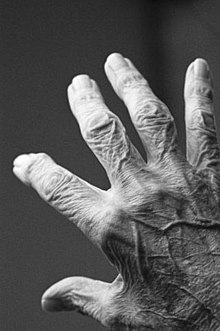

Biogerontology is the sub-field of gerontology concerned with the biological aging process, its evolutionary origins, and potential means to intervene in the process.[1] The term "biogerontology" was coined by S. Rattan, and came in regular use with the start of the journal Biogerontology in 2000. It involves interdisciplinary research on the causes, effects, and mechanisms of biological aging. Biogerontologist Leonard Hayflick has said that the natural average lifespan for a human is around 92 years and, if humans do not invent new approaches to treat aging, they will be stuck with this lifespan.[2] James Vaupel has predicted that life expectancy in industrialized countries will reach 100 for children born after the year 2000.[3] Many surveyed biogerontologists have predicted life expectancies of more than three centuries for people born after the year 2100.[4] Other scientists, more controversially, suggest the possibility of unlimited lifespans for those currently living. For example, Aubrey de Grey offers the "tentative timeframe" that with adequate funding of research to develop interventions in aging such as strategies for engineered negligible senescence, "we have a 50/50 chance of developing technology within about 25 to 30 years from now that will, under reasonable assumptions about the rate of subsequent improvements in that technology, allow us to stop people from dying of aging at any age".[5] The idea of this approach is to use presently available technology to extend lifespans of currently living humans long enough for future technological progress to resolve any remaining aging-related issues. This concept has been referred to as longevity escape velocity.
Biomedical gerontology, also known as experimental gerontology and life extension, is a sub-discipline of biogerontology endeavoring to slow, prevent, and even reverse aging in both humans and animals.
- ^ Ankrah, Paa Kwesi; Mensah, Enock D; Dabie, Kwabena; Mensah, Caleb; Akangbe, Benjamin; Essuman, Jonathan (2024). "Harnessing Genetics to Extend Lifespan and Healthspan: Current Progress and Future Directions". Cureus. doi:10.7759/cureus.55495. PMC 10990068. PMID 38571872.
- ^ Geoff Watts (June 2011). "Leonard Hayflick and the limits of aging". The Lancet. 377 (9783): 2075. doi:10.1016/S0140-6736(11)60908-2. PMID 21684371. S2CID 205963134.
- ^ Christensen, L; Doblhammer, K; Rau, G; Vaupel, JW (2009). "Aging populations: the challenges ahead". The Lancet. 374 (9696): 1196–1208. doi:10.1016/s0140-6736(09)61460-4. PMC 2810516. PMID 19801098.
- ^ Richel, Theo (December 2003). "Will human life expectancy quadruple in the next hundred years? Sixty gerontologists say public debate on life extension is necessary". Journal of Anti-Aging Medicine. 6 (4): 309–314. doi:10.1089/109454503323028902. PMID 15142432.
- ^ de Grey, Aubrey D. N. J.; Rae, Michael (October 14, 2008). Ending Aging. St. Martin's Griffin. p. 15. ISBN 978-0-312-36707-7.